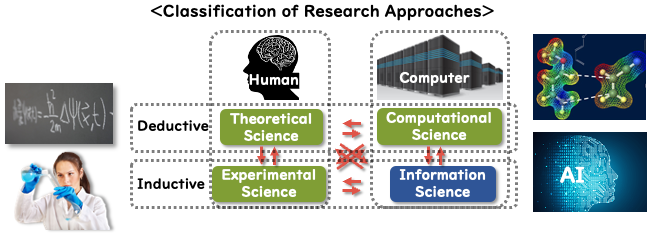A new academic revolution research area called “Digitalization-driven Transformative Organic Synthesis (Digi-TOS)” was launched in September 2021 with the aim of achieving disruptive innovation in organic synthesis through the fusion of the disparate fields of organic synthesis (experimental science) and data science (information science).
Organic synthesis chemistry, which is a foundational academic field that supports the creation of high-complexity molecular compounds with ultra-high added value such as pharmaceuticals, agrochemicals, and functional materials from easily accessible and inexpensive organic raw materials, has been referred to as the modern alchemy and has led the world with Japan at the forefront. However, in the face of intense global competition and rapid social changes, the conventional research approach, which relied on tremendous effort and long working hours, has reached its limits and a transformation in organic synthesis chemistry is imperative for Japan to continue to lead the world.
Until now, research has been conducted using an inductive approach that involves accumulating vast numbers of experiments and analyses. In recent years, efforts have been made to improve development efficiency through deductive approaches such as computational science. On the other hand, approaches based on information science such as machine learning, which use the same inductive approach as experimental science, are expected to be extremely valuable, but their use in organic chemistry is limited and still undeveloped. This is due to the problem of the quantity and quality of data required for machine learning, as well as the fact that current machine learning methods cannot cope with the diversity of organic synthesis.

Therefore, this research field will revolutionize organic synthesis, accompanied by a mindset shift, through the construction of a unique digital platform (PF) that can cope with the diversity of organic synthesis. This research field maximizes the benefits of group research and is distinct from conventional AI research. Specifically, it will eliminate waste through automated methods (molecular structure automatic design, synthetic route automatic search, reaction condition automatic optimization, batch-to-flow automatic conversion, and autonomous automatic synthesis system) that thoroughly utilize artificial intelligence (AI), as well as build its unique database (DB) optimized for machine learning in organic chemistry, which forms the foundation for the development of automated methods. With the promotion of this research field, we aim to achieve ultra-acceleration of innovative reactions and the creation of innovative molecules, leading to the exploration of uncharted territories in the future.
